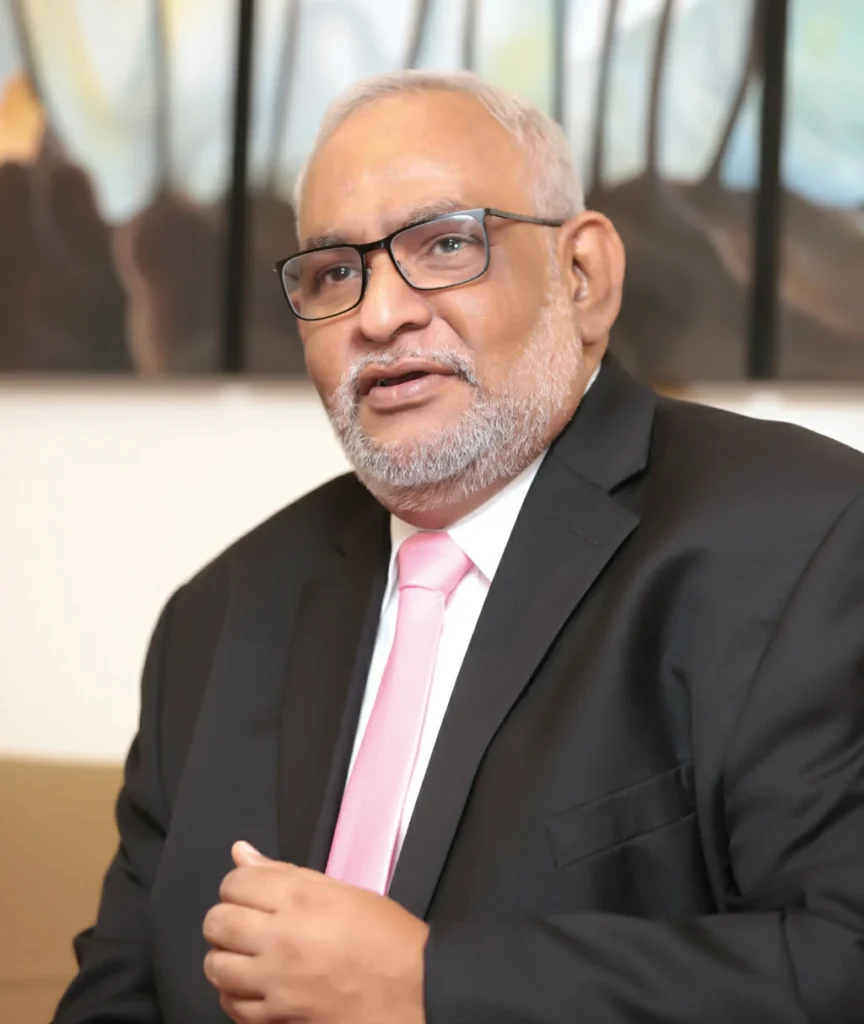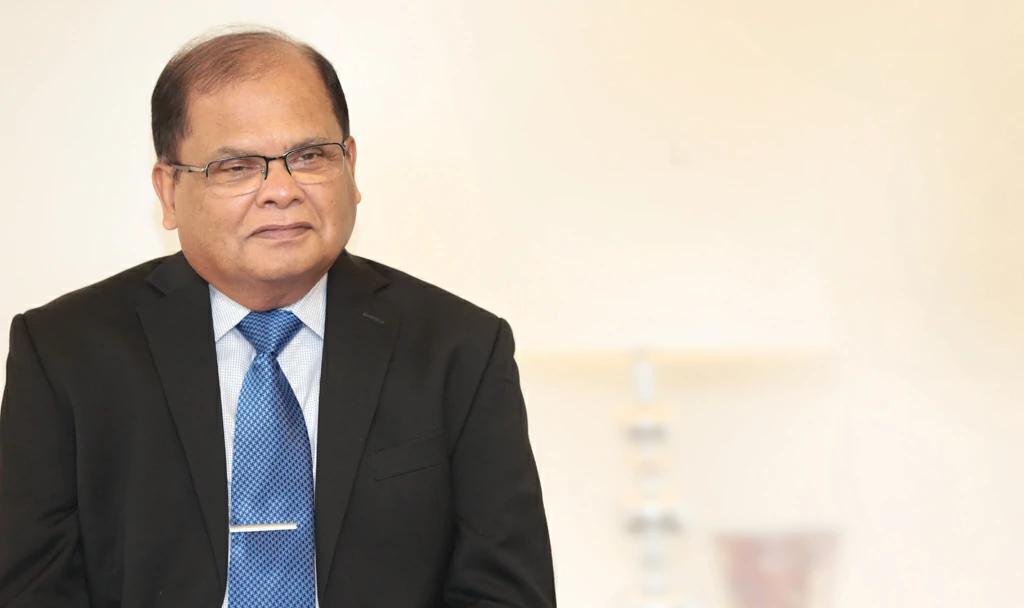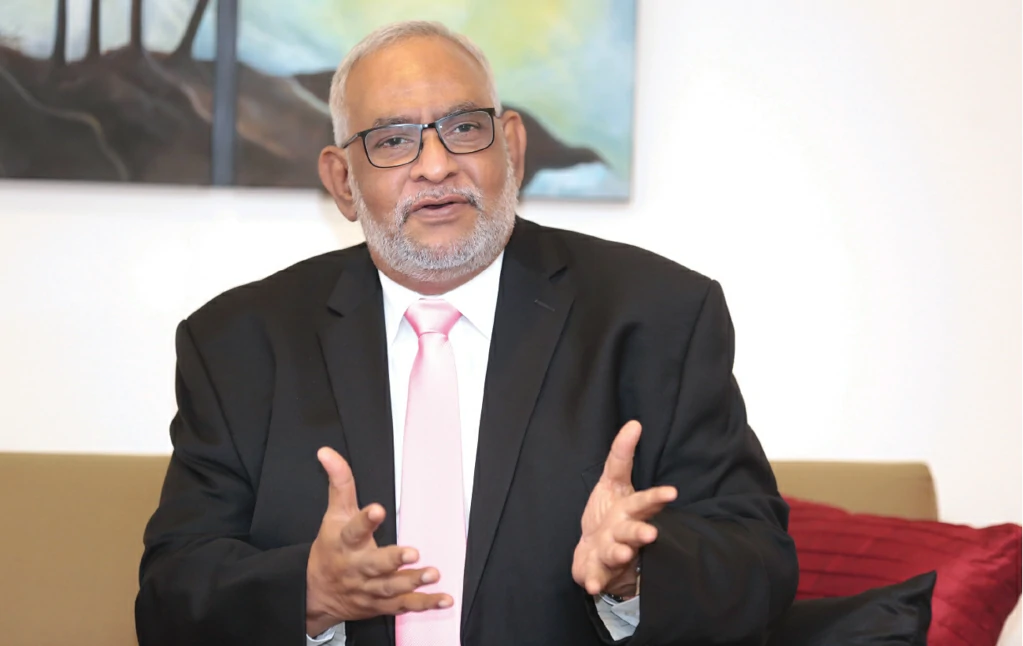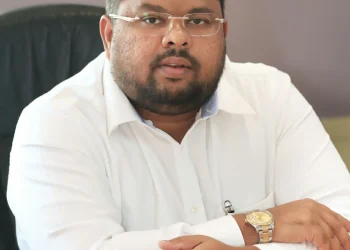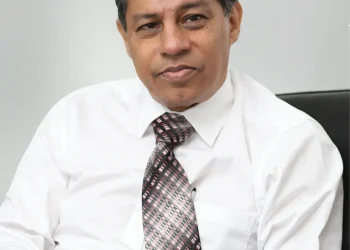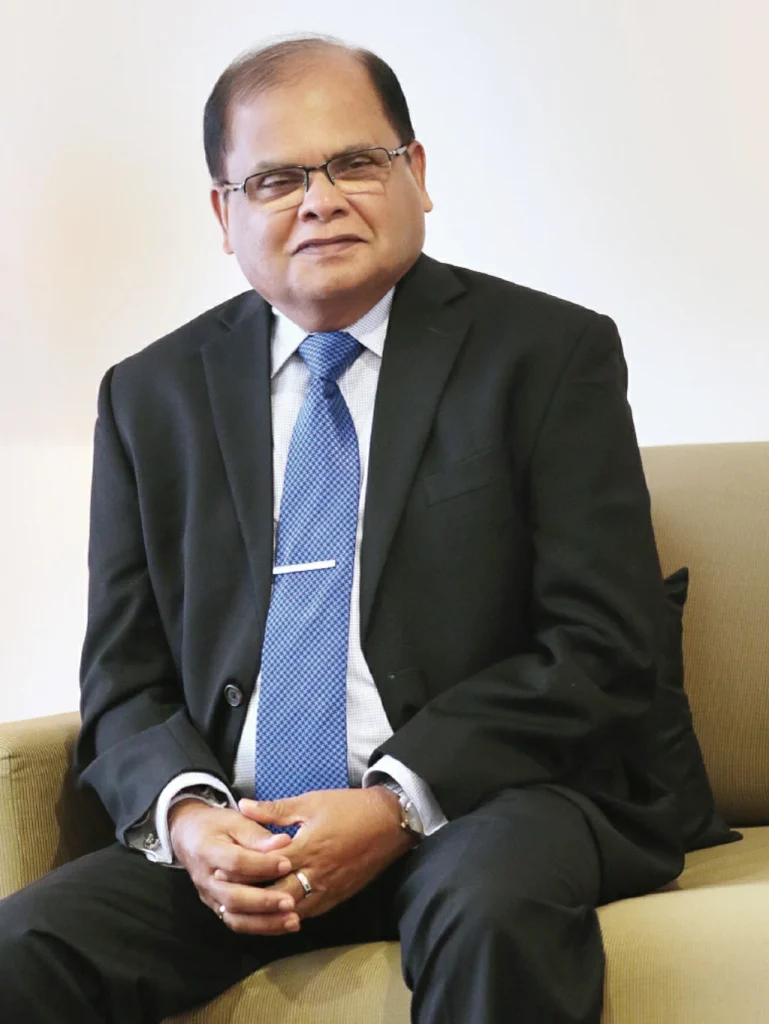
Commercial Bank, the largest private bank in Sri Lanka, has for decades been at the forefront, driving the country and sector forward. The Bank’s approach has always been centred around its customers as well as in providing the highest rate of return for their stakeholders. As a leading private sector organisation in the country, the Commercial Bank is also dedicated towards National Policy Level discussions on improving Sri Lanka’s financial inclusion and financial literacy. Currently, the only Chairman of a bank in the country with finance and banking experience, Dharma Dheerasinghe and Jegan Durairatnam, Managing Director/CEO speak about Commercial Bank’s performance, plans for expansion and on its evolution to suit the modern needs of customers.
By Udeshi Amarasinghe
Photography Mahesh Bandara and Menaka Aravinda
Your interview was featured in Business Today in September 2014. Could you tell us about the performance of Commercial Bank since? What is the Bank’s strategic direction?
Jegan Durairatnam (JD) – Commercial Bank has become the first private bank in Sri Lanka to pass the one trillion assets barrier. We have also gone up 19 positions to number 948 in the world ranking, in the top 1,000 banks in the world. Our most recent strategic endeavour is that Commercial Bank has moved into Myanmar. We had taken 55 per cent of a new bank in the Maldives, which is now fully operational. We have also on an average of about 20 per cent growth, both in assets and profit.
Commercial Bank is basically very much focused in Small and Medium-sized Enterprises (SME). We concentrated on SME before it became a fad, as today everyone wants to be in that segment. People assume there is money in it. However, good SMEs demand better prices than corporates today. We are very strong because we have the information. We have grown with the SME sector and they have learned to trust us. Therefore, we will continue to focus on SMEs.
Dharma Dheerasinghe (DD) – We are the largest private sector bank and most-awarded bank in Sri Lanka. We have received almost all awards from organisations such as The Banker and Global Finance; in certain instances, these have been received for the 17th year. We have achieved a significant position in the banking sector today and want to maintain it. After all, it is relatively easy to attain a position, but it is more difficult to maintain it. We are determined to maintain our position. We require a good strategy as Sri Lanka is a small economy and a small market. It has not been growing at the rate one would have wanted it to. In the 1980s and 90s, countries such as South Korea grew at a pace of 18 to 22 per cent per year. Our growth rate, as forecasted by the Central Bank or any international agency, like IMF, is around 5.0 per cent. As such, the market expansion will also be curtailed. Therefore we have been looking at overseas expansion.
We Have Achieved A Significant Position In The Banking Sector And Want To Maintain It. After All, It Is Relatively Easy To Attain A Position, But It Is More Difficult To Maintain It.
We are doing well in our expansion, and in addition to Bangladesh, Myanmar and the Maldives, we also received the license from the Bank of Italy, which is in the European Union. We can operate in any country in Europe with this license. Operations in Italy have gone beyond breakeven point within a matter of a few months. We are also the fourth largest foreign bank in Bangladesh.
JD – Bangladesh is growing at a steady pace, and also has excess liquidity at the moment, similar to what Sri Lanka went through a few years ago. However, credit growth is picking up and we are doing well. Our NPLs are under one per cent, which is very good for that market.
How was the bank’s performance during the last financial year?
JD – We have released the results of the first half of the year and our performance has been extremely good. Comparatively, although you see that the Net Interest Margins have declined and cost of funds have increased, we have expanded our assets sufficiently to attain good results. We are concerned about nonperforming assets and have managed to curtail them significantly.
Our relationship with our shareholders is very good. It is indicative in the fact that our rights issue was oversubscribed. We did not even have to present a compelling pitch as our performance alone was adequate to convince them. If you consider the amount of additional shares requested that is almost a large percentage of the rights issue itself. That indicates the demand for Commercial Bank shares. It is also implied in the share prices, which is about 1.4 times of the net worth where as with everyone else it is at about 1.12 per cent. People recognise that we are a strong and steady bank.
DD – Overseas we find that our shares are very much in demand and there are clear indications that foreign investors are interested in our shares. At the moment we have about a 36 per cent shareholding held by foreign investors.
As the largest private bank in the country, what are your thoughts on the customer’s behaviour in terms of spending, borrowing and saving?
JD – We realise that the gap between savings and borrowings by customers has with time widened substantially. Therefore, all new deposits fall into term deposits, where people have kept money for their convenience; however, the portion of money kept for convenience has decreased. The structure of savings has moved to high-end deposits rather than low-end savings. In terms of the lending perspective, two years ago we had a steady continuous consumer-based growth, but it has rather slowed down together with the monetary policy measures taken by the Government, which has naturally raised the interest rates.
Could you elaborate on customer behaviour in terms of changing monetary policy?
DD – Commercial Bank has a clientele of about 3.6 million. A customer may have more than one account with us. We have a population of 22 million in Sri Lanka and my estimate is that we have more people who do not have access to finance or those who are virtually illiterate in terms of finance. Financial inclusion is something that we are looking at. As the largest private bank in Sri Lanka we feel that this is a responsibility we have as stakeholders of this economy. We are also assisting at the national policy level for increased financial inclusion and financial literacy. Having a great majority of people in the country left without access to finance does not sound well for the banking industry of Sri Lanka.
How is Commercial Bank catering to the evolving needs of the customer?
JD – We have recently borrowed 100 million dollars from the International Finance Corporation (IFC) for Green Financing. We believe this is a niche opportunity that will play out well over the next three to four years. We are in the process of preparing ourselves for green financing and are training our personnel through IFC to show our customers the benefits of moving towards green financing. It is not merely about solar panels and wind mills, it is about efficient machinery, the consumption of less energy and sustainability. We hope to have a reasonable portfolio, so that we may someday be in a position to issue green bonds. India has already realised this.
Commercial Bank Is In The Forefront Of Automation, And One Difference Is That We Bring To The Table Proven Technology That Has Been Tested Carefully.
Customers are of course also moving towards automation. However, we find the biggest automation is taking place at the branch, where people are now transacting with a machine, and are moving away from requiring to be served. The machines have come quite far and customers trust these machines to handle their money. Commercial Bank is in the forefront of automation, and one difference is that we bring to the table proven technology that has been tested carefully. We are always about the being the best to market. We constantly tell our technology staff; “your technology must work”. Whenever we pass a branch, we first check whether the ATM is in operation. It is ingrained in our culture that all our technology must work.
At Commercial Bank we believe in introducing technology that matters to the customers.
The traditional banking model is changing today. Could you elaborate a little on that?
JD – Especially in bank branches, we are moving from a completely manual human assisted branch model to an assisted automated model. We find that people still need human intervention, so we cannot rely on machines alone. Therefore, we are moving towards having machines, but also staff to assist and reassure the customer in case of a mishap. There is always someone they can talk to. We believe that this is the only way to go forward in Sri Lanka.
DD – We are a bank that believes that systems have life beyond human beings. Unless there is a system failure, system errors are much less when compared with human errors. However, a challenge we face is in taking customers forward with advanced technology. We have two fully Automated Banking Centres, yet we find it difficult to get customers to use the systems available in those centres. We need someone to assist them. In banking in Sri Lanka today, although each branch has an ATM, you will find customers queuing up at the counter for basic functions such as withdrawals. Therefore, there is a trade off between the investment we make on technology, and whether or not we are getting a sufficient return on that investment by way of productivity. A part of our job is also to make customers believe in systems.
Commercial Bank has been a great contributor to the economy of Sri Lanka and has been a partner in many development projects. Could you elaborate on this aspect?
JD – We are a bank that has partnered in a number of development projects in Sri Lanka. In most of the areas where financing from the private sector is required, we have been at the forefront. One of the key aspects of our role is in building capacity amongst entrepreneurs. We find that, this is one of the biggest issues this country faces; improving the financial and skills capacities of entrepreneurs. We make significant investments in constructing that eco system for the growth of this country.
We Have Lower Rates Of Return, Which Means Our Lending Rates Are Lower. This Is Indicative Of Our Strategy Of Being More Focused On SMEs.
DD – I believe that the regulator and banking supervisors are looking at the net interest margin. In emerging markets or developing countries like Sri Lanka we see that the net interest margins are relatively higher than those in developed markets. Developed markets operate with very thin margins. 10 – 15 years ago, the interest margin on average in the banking industry in Sri Lanka was about six per cent. Today it has declined to around four per cent. Our margins are even lower. Considering both sides of the equation, that is the cost of funds of deposits we mobilise from savings and borrowings and our lending rates, we find the net interest margin. We have one of the lowest in the market as far as interest margins are concerned. We have lower rates of return, which means our lending rates are lower. This is indicative of our strategy of being more focused on SMEs.
Your plans for expansion in Sri Lanka and overseas?
JD – We will continue our expansion in both Sri Lanka and overseas. We are committed to grow at least by 16 – 17 per cent a year. This year our focus will be on expansion in Myanmar. We waited until our Maldives investment got off the ground as well as results from our Italian expansion.
DD – Although the Italian operation had been established for some time. We got the license to operate independently only recently. Due to many issues we encountered when operating as an agent of another company, we decided to launch our own operation. This is called Commex SRL, which is a company incorporated in Italy now. We have our own status and, therefore we have the freedom to quote more competitive rates and attract more business. We started our operations in Rome, and now have seven agents in other parts of Italy. We are now planning to appoint about four more agents in line with our plan to cover the entire country. Italy is one of the better places for Sri Lankan workers and their wages are much higher. Skilled Sri Lankans employed in Italy get paid three to four times more than their counterparts in the Middle East. In Sri Lanka, a benefit is that we have more diversified income sources. Inward remittances to Sri Lanka originate from different parts of the world, not necessarily from the Middle East. Today, the Middle East accounts for little less than 50 per cent in terms of remittances in flows. Italy is thus a more stable origin of remittances.
Looking at the banking sector in general, could you tell us how the industry is performing?
JD – The industry is doing quite well. That in itself is the problem because everyone is on the borderline of liquidity and are chasing meagre deposits. Our sector competition is pushing the rates up. You may certainly be getting a better deal, however cost of funds will certainly add up when we chase the same deposit. That in itself is a measure of how well all the banks are performing.
DD – Banking regulator, the Central Bank has been increasing the minimum capital requirement of Banks. There is a regulatory requirement for capital adequacy that we have to comply with. We are very compliant and have our capital adequacy somewhat in excess of the minimum requirement. We raised ten per cent of our capital through a rights issue, which is Tier 1 capital. We were the first to raise capital and get our rights fully subscribed. We have other sources of raising Tier 2 capital. For the industry to expand, financial institutions must have more capital, and only with more capital can banks lend more. There is a limit to what a bank could lend to a single customer.
Future plans for Commercial Bank?
JD – We will evolve with the market and have generally been one of the first to do so. We will progress where our processes and procedures allow us to. We are not the kind of bank that will venture into anything and everything for the sake of it. We are first bankers and everything else is secondary. Where there is an opportunity for banking, to supply customers with banking needs, we will evolve. We will rarely venture into areas that do not involve banking.
Commercial Bank Has Always Been In The Forefront In All Fields, Yet It Has Done So With A Calm And A Steady Approach.
DD – That is correct. We concentrate on core banking and as a financial intermediary we have been doing the business of borrowing and lending. We do not have a big group as some of our peer banks. However, there are advantages in having subsidiaries. We are looking at expanding our Group in certain areas and currently have a finance company with a specific strategy. We have established an investment banking unit within Commercial Bank. It is moving slowly but steadily and the investment banking has to grow. Although there should be IPOs and new debt instruments in the debt market, not enough activities occur. Not many corporates are raising capital. Therefore, our investment banking activities in Sri Lanka are restricted. Yet, there are good prospects and there is great potential for investment banking or fee based activities, which is a kind of low risk business that we undertake.
Message to the readers?
DD – We have a culture that we have built over the years and for which I must complement our predecessors who have worked to bring Commercial Bank to this level. Our customers are our priority. Customer centricity is a key focal point and our staff are geared to cater to their needs.
JD – Commercial Bank has always been in the forefront in all fields, yet it has done so with a calm and steady approach. Our customers are used to everything working seamlessly including our stability and forward thinking nature. They have acknowledged that our service levels are standard. Our largest challenge is in maintaining the level of service and products, it is not easy, but we will always support them.
